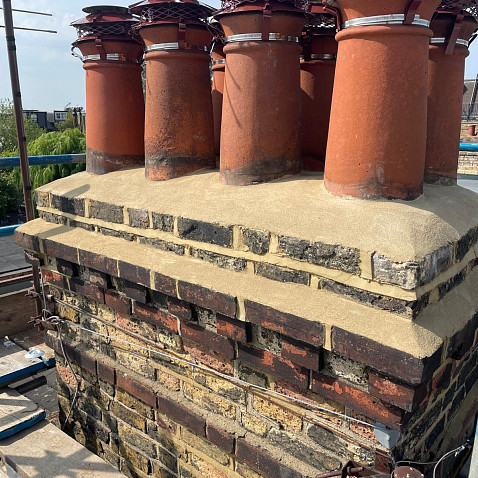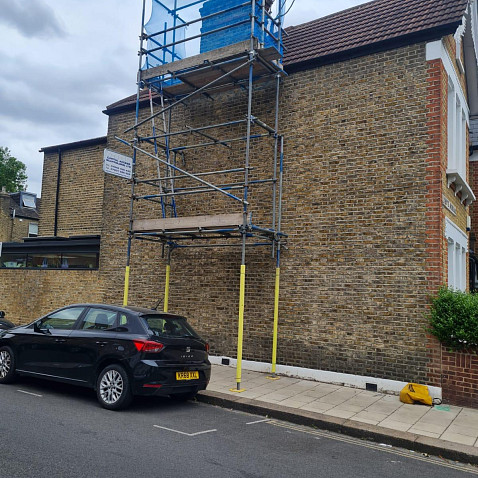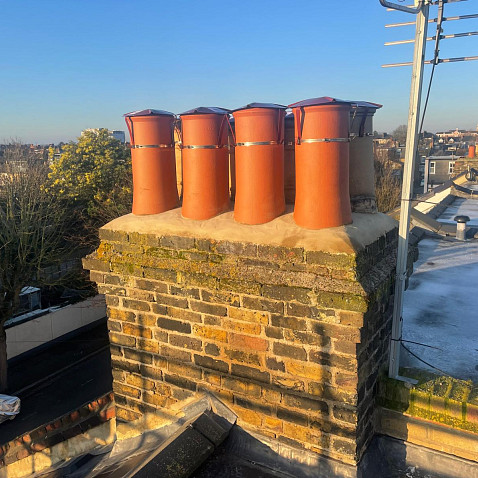As the highest point on any property, chimneys are constantly exposed to the elements. Over time, fluctuating temperatures, heavy rainfall, and strong winds can take their toll—gradually weakening the brickwork and mortar joints. This weather-related wear often leads to cracks in the chimney crown, which can allow water to penetrate the structure.
Unchecked, these issues may result in loose chimney pots, internal damp, and even timber rot in your loft space. Because such problems often develop out of sight, they frequently go unnoticed until significant—and costly—damage has already occurred. Regular inspection and timely repairs are essential to protecting your home from long-term structural issues.
Book an installation

The chimney crown—the topmost element that seals the chimney structure—is a small but critical line of defence against water ingress. It prevents rainwater from seeping into the masonry below, safeguarding the chimney’s structural integrity.
However, due to constant exposure to the elements, the chimney crown is especially prone to cracking and deterioration over time. Even minor damage can allow moisture to enter, leading to internal leaks, damp patches, and further structural decay.
If you notice signs of a chimney crown leak, such as visible cracks or water stains near the chimney breast, it's crucial to act quickly. Prompt repairs by a qualified roofing specialist can prevent more extensive—and expensive—damage down the line.
Book an installationThe chimney crown is a small but vital component of the chimney, it plays a pivotal role in preventing water intrusion. Unfortunately, it's also the section of the chimney most vulnerable to weather-related wear and tear. Should you observe any cracks or damage to the chimney crown, it's essential to arrange for prompt repairs to prevent any additional damage.
Spalling bricks occur when moisture seeps in the bricks and mortar, resulting in the bricks breaking apart. Should you notice spalling bricks within your chimney, it is of utmost importance to contact a professional to prevent any additional damage.
Leaning chimney pots are not just a charming architectural quirk. They can also be a sign of potential danger, as their instability could lead to them toppling over, damaging roofs, cars, or even injuring people below. Regular maintenance and inspections are necessary to ensure that these old structures remain safe and secure.
The Flashing refers to the protective layer of material which covers where the chimney and the roof meet. This layer serves to prevent leaks at the connection point. Unfavorable weather conditions have the potential to result in wear and tear on the flashing, it is essential to get flashing inspected and repaired where required.

Knights Roofing knows the importance of maintaining your property's health and safety. That's precisely why we provide an extensive chimney repair solution aimed at ensuring your chimney remains in optimal condition.
Contact Us
A chimney breast leak is often caused by damaged flashing, cracks in the chimney crown, or spalling bricks. Water can seep into the structure, leading to damp patches, rotting in the loft, or staining on interior walls. Prompt repairs are essential to prevent further damage.
Common signs include leaning chimney pots, visible cracks in the crown, crumbling or spalling bricks, and signs of water damage inside the property. If you're unsure, our team at Knights Roofing can carry out a full inspection across London and nearby areas.
Chimney flashing is a waterproof seal installed where the chimney meets the roof. Its main role is to prevent water ingress. Damaged or poorly installed flashing is one of the most frequent causes of chimney leaks, especially in London's variable climate.
Yes. A leaning chimney pot can become unstable and pose a serious risk to people and property below. It's a sign that the chimney structure may be weakened and requires professional assessment and repair.
Spalling occurs when moisture enters bricks and causes them to flake, crack, or crumble. Left untreated, this weakens your chimney’s structure and increases the risk of water damage. It's best to call in a professional if you notice this.
Absolutely. Knights Roofing provides expert chimney repairs across all of London and surrounding areas. Whether it's minor flashing work or full chimney crown restoration, we've got you covered.
Costs vary depending on the extent of damage and access requirements. Minor flashing or crown repairs start from affordable rates, and we offer free estimates with no obligation.
Yes, chimney-related leaks can lead to damp patches, mould growth, or rotting timber inside your loft or walls. Fixing the chimney quickly can prevent costly structural damage and health risks.